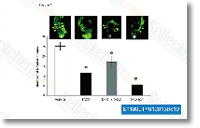Conclusions All round, our review shows that ATP petitive inhibi tors of mTOR efficiently decreased the development of colon cancer cells the two in vitro and in vivo. Additionally, additionally, it demonstrates that the anticancer efficacy of ATP petitive inhibitors of mTOR is potentiated from the simultaneous pharmacological blockade on the MEK MAPK signaling pathway in colon cancer cells. As a result, ATP peti tive inhibitors signify promising agents during the deal with ment of CRC that warrant to get examined in clinical trials. Invasion is often a important phase within the progression of prostate cancer from a manageable to an intractable disorder. So that you can invade, tumor cells must detach through the tumor mass. Its broadly held that the transition to inva sion will involve modifications inside the expression of key cell cell and cell ECM adhesion molecules and that these alterations facilitate escape of tumor cells and their subse quent spread to other organs within the entire body.
These improvements can also signal shifts in important mechanical adequate ties within the tumor. A single this kind of property, tumor cohesion, continues to be demonstrated to influence tumor cell detach ment and invasiveness of lung muscle and brain tumors. E cadherin selleckchem could be the predominant cadherin that mediates direct cell cell cohesion in epithelial tissues. E cadherin expression in human pros tate cancer specimens is significantly down regulated or absent in large grade lesions Interestingly, absence of E cadherin expression is often connected with an up regulation of mesenchymal selleck chemicals Cabozantinib cadherins, as well as N cad herin and cadherin 11 In this kind of scenarios, net cadherin expression might not necessarily change. Consequently, the general cohesion from the tumor could be unaffected. Adjustments inside the expression amounts of other adhesion sys tems may also be required to reduce general tumor cohesion.
Integrin ECM interactions perform a key position in cell adhe sion. In prostate cancer, a switch in both integrin expression and while in the secretion of an aberrant ECM are associated with progression to invasion Numerous stu dies have reported deregulation of the two a and b subunits as prostate cancer progresses Between the a subunits, a5 integrin is down regulated in adeno carcinoma with the prostate Alpha 5 integrin inter acts with  the b1 subunit to form a5b1 integrin, the primary receptor for fibronectin Apart from a sig naling function in mediating cell proliferation, migration, and differentiation, the interaction concerning a5b1 integ rin and fibronectin promotes the polymerization and assembly of fibronectin right into a matrix Fibronectin polymerization is known as a essential regulator of extracellular matrix organization and stability Fibronectin matrix assembly has been proven to markedly influence tissue cohesion and to specify liquid to solid phase transitions of 3D cellular Accordingly, down regulation of a5 integrin by high grade prostate cancer cells can, in principle, disrupt matrix assembly, reduce cohesion, and facilitate the detachment of tumor cells from your mass.
the b1 subunit to form a5b1 integrin, the primary receptor for fibronectin Apart from a sig naling function in mediating cell proliferation, migration, and differentiation, the interaction concerning a5b1 integ rin and fibronectin promotes the polymerization and assembly of fibronectin right into a matrix Fibronectin polymerization is known as a essential regulator of extracellular matrix organization and stability Fibronectin matrix assembly has been proven to markedly influence tissue cohesion and to specify liquid to solid phase transitions of 3D cellular Accordingly, down regulation of a5 integrin by high grade prostate cancer cells can, in principle, disrupt matrix assembly, reduce cohesion, and facilitate the detachment of tumor cells from your mass.
Hiv Protease Signal
Each virion comprises a viral envelope and associated matrix enclosing a capsid.
